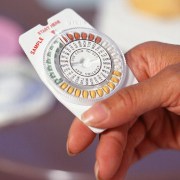 Photo: Getty Images
Photo: Getty Images
This week birth control pills have been in the news because there was a problem with a certain batch from Pfizer. I will give you information about the recall at the end of the article. Before I do I have a question for you.
Have you ever wondered how birth control pills work in the body?
Every year when I teach about female reproductive system I usually have at least one student ask how the process works. I thought I would take a few minutes to explain how birth control pills work to help understand why Pfizer had to recall Lo/Ovral®-28 and Norgestrel/Ethinyl Estradiol Tablets.
A women gets pregnant because she releases an egg from the ovary (this process is called ovulation) and it gets fertilized by sperm (this process is called fertilization) usually in the fallopian tubes or in the uterus.
In order to prevent pregnancy birth control pills are designed to prevent ovulation or fertilization. Both of these processes can be altered or stopped by using additional female hormones, estrogens or a combination of estrogen and progestins.
The estrogen is used to suppress ovulation. If the egg is never released from the ovary a woman will not get pregnant and she will have a period approximately two weeks later. The combination of estrogen and progestin pills also tries to suppress ovulation as well as alter the lining and mucus of the uterus.
The birth control pill thickens the cervical mucus in the uterus making it difficult for sperm to get into the uterus to fertilize an egg. The lining of the uterus is also affected so that a fertilized egg would not be able to implant and grow into a fetus in the uterus. The combination of these processes highly diminishes the likelihood of pregnancy.
Generally speaking, a woman will take active pills -- pills that contain female hormones for 21 days -- and then they will take inactive pills, pills that do not contain female hormones for 7 days. This keeps the cycle on a 28 day period.
Now that we have a general understanding of how birth control pills work in a woman’s body, let's understand why there was a need for a recall of several lots of birth control pills from Pfizer.
Lo/Ovral®-28 and Norgestrel/Ethinyl Estradiol Tablets and their generic form was recalled because the exact amounts of active and inactive pills may be incorrect. If there is an incorrect dose of active pills it is possible that ovulation may occur, increasing the likelihood of pregnancy even if the patient is taking the pills on a daily basis.
There was also the possibility that the active and inactive pills may have been put in the wrong sequence. Again this could increase the likelihood of ovulation or pregnancy.
The result of incorrect sequence or incorrect amounts of active or inactive pills could make the pills ineffective and give no protection from fertilization. Simply stated, a woman could get pregnant while taking these ineffective pills.
Whether you are taking the Lo/Ovral®-28 that has been recalled or any type of birth control pill, I think it is always a good idea to understand how medications are working in your body. I hope this help explain it to you.
Live Vibrantly,
Dr. Dae
http://twitter.com/drdae
https://www.healthydaes.com
https://www.facebook.com/healthydaes
Dr. Dae is a Naturopathic Physician who practices in the Washington DC metro area treats the whole person using safe and effective combinations of traditional and natural methods to produce optimal health and well-being in the lives of her patients.
Sources:
"Birth Control Pills - Types, Effectiveness, and Side Effects of Birth Control Pills." WebMD - Better information. Better health.. N.p., n.d. Web. 2 Feb. 2012. http://www.webmd.com/sex/birth-control/birth-control-pills
"Lo/Ovral-28 (Norgestrel/EthinylEstradiol) Tablets: Recall - Possibility of Inexact Tablet Counts or Out of Sequence Tablets." U S Food and Drug Administration Home Page. N.p., n.d. Web. 2 Feb. 2012. http://www.fda.gov/Safety/MedWatch/SafetyInformation/SafetyAlertsforHumanMedicalProducts/ucm289803.htm
Reviewed February 3, 2012
by Michele Blacksberg RN
Edited by Jody Smith





Add a CommentComments
There are no comments yet. Be the first one and get the conversation started!